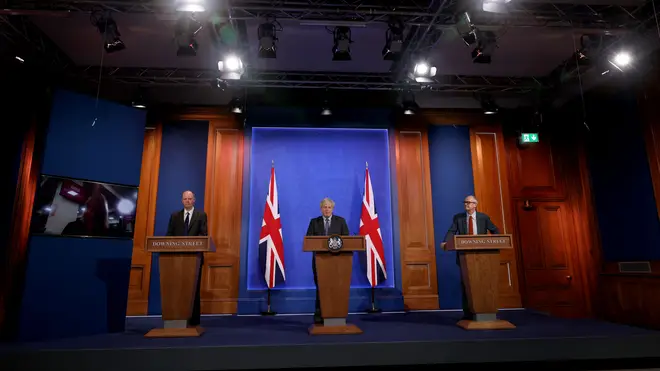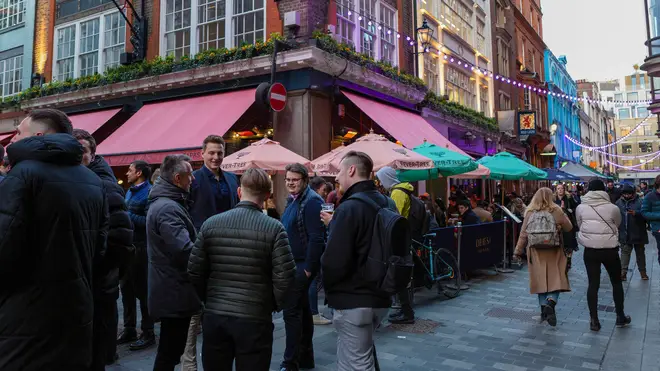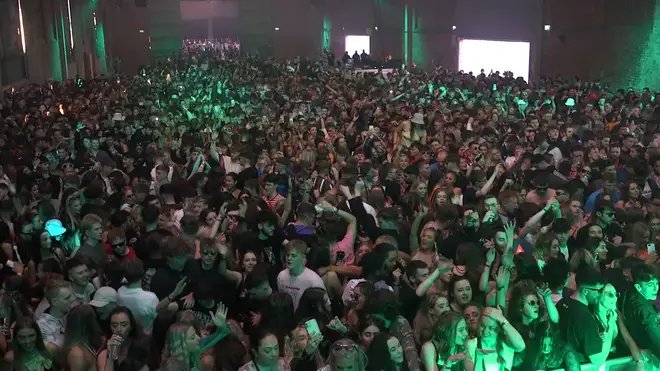
James O'Brien 10am - 1pm
14 June 2021, 20:20 | Updated: 15 June 2021, 20:26

Prime Minister Boris Johnson has confirmed a four-week delay to the final easing of restrictions, but some changes will still go ahead from 21 June.
Boris Johnson has announced that the fourth stage of the government's roadmap out of lockdown is to be delayed by four weeks to "give the NHS a few more crucial weeks" to vaccinate people.
Speaking at a press conference, he said there was a "very real possibility that the virus will outrun the vaccines" and said he thought it was "sensible to wait just a little longer", and delay the final relaxation until more adults have had both jabs.
Read more: PM pushes back Covid-19 'Freedom Day' in England to July 19
Read more: Vaccines 'highly effective' against hospitalisation from Delta variant - PHE
However, while the complete relaxation of restrictions is now scheduled for 19 July - with a review in two weeks time in case the situation has improved - some rules are changing from 21 June.
Here's what you can and can't do:

PM confirms 'Freedom Day' delay
From 21 June, the number of people who can attend weddings, civil ceremonies and other commemorative events such as wakes will be determined by the number of people a venue can safely accommodate.
This is different to the current rules, which say there is 30-guest limit.
The exception to this is if the event is held in a private home or "enclosed structures" in private gardens, in which case the standard rule of six - or two households - applies.
Other rules, such as social distancing and the requirement for table service, will remain unchanged after 21 June.
Read more: Wedding restrictions in England - explained

Matthew Thompson rounds up new wedding Covid rules
With the delay to the roadmap, the current rules on socialising in groups will remain as they are.
You can meet up to 30 people outside, but inside your groups are capped at six people or two households.
Whether or not you social distance from friends and family remains a personal choice, but you are advised to be "cautious".
There are some exceptions to these rules, for example, organised support groups or meeting for the purpose of working or volunteering.

A "limited series of pilot events" will take place to gather data on their safety, which will include some Euro 2020 matches.
The government announced this will also include full capacity for this year's men's and women's Wimbledon finals.
Read more: Huge crowd of anti-lockdown protesters gathers at No 10 over ‘Freedom Day’ delay
Read more: 'Why are G7 world leaders allowed to have a BBQ on a beach and the public are not?'
The rules on wearing a face mask remain unchanged.
You must still wear one in most public indoor settings, such as shops and public transport, unless you are exempt or have a reasonable excuse.

PM 'confident' lockdown lifting delay won't be longer than four weeks
From 21 June, all care home residents will be able to choose an "essential care giver", who will be able to visit them even if the resident is isolating.
There will also no longer be a requirement for residents returning from visits outside of the care home to isolate for 14 days, although care homes may decide they should if their visit is particularly high-risk, for example a hospital stay.
If possible, you should continue to work from home.
Your employer must take "every possible step" to enable their staff to work from home.
If people must attend a workplace then Covid-secure rules such as social distancing should remain in place.
Read more: Speaker's angry response to Government's 'totally unacceptable' handling of Covid briefings
Read more: 'No evidence' Martin Bashir was rehired as part of Diana interview cover-up, BBC review finds
Indoor hospitality venues such as pubs, restaurants and cafes must continue to work under the same measures as they are currently.
That means there may be limits on numbers, and premises serving alcohol must provide table service.
Some businesses such as nightclubs and dance halls must also remain closed.

The delay to the 21 June easing was expected by many.
Case numbers have been on the rise, particularly of the Delta variant, which was first identified in India but is now the dominant strain in the UK.
Public Health England (PHE) data has shown that two doses of the vaccine are far more effective against hospitalisation from the Delta variant than one dose, prompting Mr Johnson to announce a delay to give the NHS time get more adults fully vaccinated.
Read more: Ban ministers from lobbying for up to five years after leaving office, watchdog demands
Read more: Public 'fed up' of 'woke' policing, chief constable says
"By Monday 19 July we will aim to have double jabbed around two thirds of the adult population, including everyone over 50, all the vulnerable, all frontline health and care workers, and everyone over 40 who received their first dose by mid-May," said Mr Johnson.
"To do this we will now accelerate the second jabs for those over 40, just as we did for the vulnerable groups, so they get the maximum protection as fast as possible, and we will bring forward our target to give every adult in this country a first dose by the 19 July."
He said that he was "confident" a four-week delay will be sufficient.